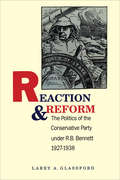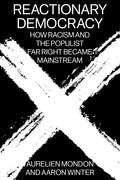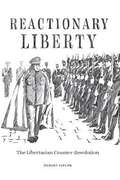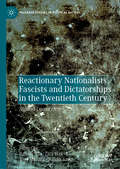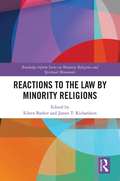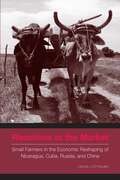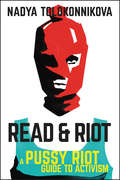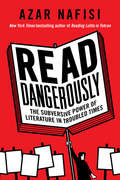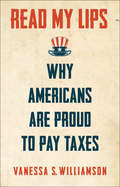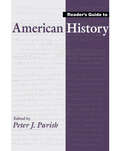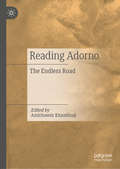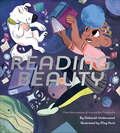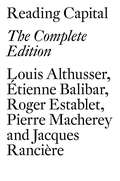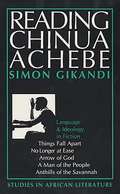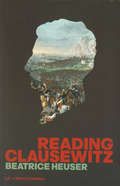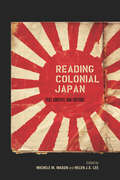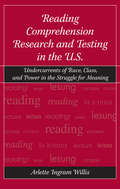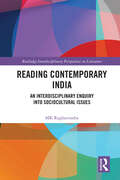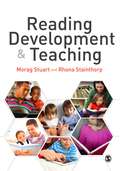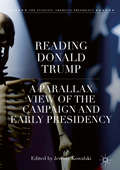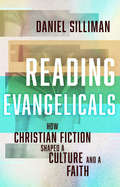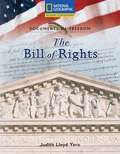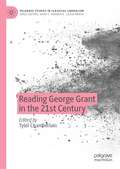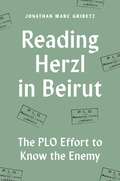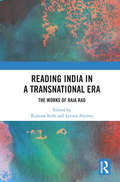- Table View
- List View
Reaction and Reform: The Politics of the Conservative Party under R.B. Bennett, 1927-1938
by Larry A. GlassfordWhen R.B. Bennett assumed the leadership of the Conservative Party of Canada in 1926, he inherited a party out of step with a modernizing Canada. Three years later, in the early days of the Depression, he led the Tories to power with a mandate to bring back prosperity. Larry A. Glassford explores the politics of Bennett's leadership, the strategies with which he tackled the Depression, and the reception he and the Conservative party received from voters and press of the day. Bennett's initial efforts to tackle the Depression took the form of activist reaction: raising tariffs, trying to balance the budget, defending the dollar. When these measures all failed to bring recovery, the Bennett-led government edged towards a reform program, creating such permanent institutions as the Canadian Radio Broadcasting Commission (later the CBC), the Bank of Canada, and the Wheat Board. Bennett tried to package his reforms as a Canadian 'New Deal,' a daring move but one that failed to revive the party. The voters were confused: did the Conservative party stand for reaction or reform? Tories themselves could not decide. The Liberals swept back into power in 1935. At the 1938 Conservative convention which chose Bennett's successor, the perplexing dichotomy remained. Fifty years after the Great Depression, the common perception of Bennett is still of the great Canadian capitalist, driving his government, his party, and the country to the never-never land of American-style high tariffs and British-style imperialism. Glassford demonstrates the inaccuracy of that caricature, and offers instead a fresh analysis of Bennett and his party.
Reactionary Democracy: How Racism and the Populist Far Right Became Mainstream
by Aaron Winter Aurelien MondonDemocracy must be anti-racist. Any less is cowardly. Any less is reactionary.Democracy is not necessarily progressive, and will only be if we make it so. What Mondon and Winter call 'reactionary democracy' is the use of the concept of democracy and its associated understanding of the power to the people (demos cratos) for reactionary ends. The resurgence of racism, populism and the far right is not the result of popular demands as we are often told. It is rather the logical conclusion of the more or less conscious manipulation by the elite of the concept of 'the people' and the working class to push reactionary ideas. These narratives place racism as a popular demand, rather than as something encouraged and perpetuated by elites, thus exonerating those with the means to influence and control public discourse through the media in particular. This in turn has legitimised the far right, strengthened its hand and compounded inequalities.These actions diverts us away from real concerns and radical alternatives to the current system. Through a careful and thorough deconstruction of the hegemonic discourse currently preventing us from thinking beyond the liberal vs populist dichotomy, this book develops a better understanding of the systemic forces underpinning our current model and its exploitative and discriminatory basis. The book shows us that the far right would not have been able to achieve such success, either electorally or ideologically, were it not for the help of elite actors (the media, politicians and academics). While the far right is a real threat and should not be left off the hook, the authors argue that we need to shift the responsibility of the situation towards those who too often claim to be objective, and even powerless, bystanders despite their powerful standpoint and clear capacity to influence the agenda, public discourse, and narratives, particularly when they platform and legitimise racist and far right ideas and actors.
Reactionary Liberty: The Libertarian Counter-Revolution
by Robert TaylorIn Reactionary Liberty: The Libertarian Counter-Revolution, Robert Taylor argues that without a reactionary element to its philosophy, libertarianism can never be a serious movement because it will always fall victim to O'Sullivan's Law: any movement or institution that is not explicitly right-wing will eventually turn left-wing. While libertarians may believe that they are "above" or "beyond" Left and Right, the Leftist infiltration of libertarianism (combined with the evolutionary psychology of r/K selection theory) proves that libertarians cannot be neutral. While offering private alternatives that can help to circumvent Leviathan-including the use of Bitcoin and cryptocurrencies, withdrawing consent, and the power of new technologies to create freer markets-Taylor poses questions that libertarians must answer if we are ever going to achieve a free society. Is democracy the highest form of political order, or does it only enable socialism to grow without limit? Will open borders and mass immigration expand, or hinder, liberty? What if cultural Marxism represents an equal or even greater threat to a libertarian society than the state? The Italian traditionalist Julius Evola embraced the reactionary spirit, calling it "the true test of courage. " With this book, Taylor blends this courage with a radical libertarianism to forge a coherent and forceful philosophy of liberty.
Reactionary Nationalists, Fascists and Dictatorships in the Twentieth Century: Against Democracy (Palgrave Studies in Political History)
by Ismael Saz Zira Box Toni Morant Julián SanzThis book provides a comparative study of fascisms and reactionary nationalisms. It presents these as transnational political cultures and examines the dictatorships and regimes in which these cultures played significant roles. The book is organised into three main sections, focusing on nationalists, fascists and dictatorships in turn. The chapters range across French, Italian, Spanish, Portuguese and German experiences, and include a broader overview of the political cultures in Central and Eastern Europe as well as Latin America. The chapters consider the identities, organizations and evolution of the various cultures and specific political movements, alongside the intersections between these movements and how they adapted to changing contexts. By doing so, the book offers a global view of fascisms and reactionary nationalisms, and promotes debate around these political cultures.
Reactions To the Law by Minority Religions (Routledge Inform Series on Minority Religions and Spiritual Movements)
by Eileen Barker and James T. RichardsonMuch has been written about the law as it affects new and minority religions, but relatively little has been written about how such religions react to the law. This book presents a wide variety of responses by minority religions to the legal environments within which they find themselves. An international panel of experts offer examples from North America, Europe and Asia demonstrating how religions with relatively little status may resort to violence or passive acceptance of the law; how they may change their beliefs or practices in order to be in compliance with the law; or how they may resort to the law itself in order to change their legal standing, sometimes by forging alliances with those with more power or authority to achieve their goals. The volume concludes by applying theoretical insights from sociological studies of law, religion and social movements to the variety of responses. The first systematic collection focussing on how minority religions respond to efforts at social control by various governmental agents, this book provides a vital reference for scholars of religion and the law, new religious movements, minority religions and the sociology of religion.
Reactions to the Market: Small Farmers in the Economic Reshaping of Nicaragua, Cuba, Russia, and China (Rural Studies)
by Laura J. EnríquezIt is manifest in developing countries around the world that the “shock” therapy administered to their economies by the neoliberal model of structural adjustment has failed, leaving much social and economic destruction in its wake. In Latin America this failure has led to a resurgence of interest in alternative models, some of them deploying various versions of socialism, as in Bolivia, Chile, and Venezuela, which has given rise to talk about the new “pink tide” enveloping the region. In this comparative study of four economies that have been making a transition to the market from their orthodox socialist pasts, Laura Enríquez focuses our attention on the plight of the small farmer in particular and on the importance of this sector for the overall socioeconomic success of the transition. Through this comparison, we see the similarities between Nicaragua and Russia in their rapid retreat from socialism and their adoption of reforms that have placed small agriculture, especially that focused on food crops, at a distinct disadvantage relative to export-oriented production. By contrast, Cuba has been more like China in adopting aspects of market reform while emphasizing small-scale cooperative and private farming in an effort to achieve food self-sufficiency. Drawing insights from Karl Polanyi’s study of the social and economic effects of the expansion of market relations in the nineteenth century, Enríquez highlights the role of the state in each of these countries in driving change in a certain direction: toward de-emphasis of small-scale farming and the eventual assumed demise of the peasantry in Nicaragua and Russia, which has led to countermovements of peasants struggling to survive, and toward the reconfirmation of the value of small farming in contributing to balanced economic development in Cuba and China.
Read & Riot: A Pussy Riot Guide to Activism
by Nadya TolokonnikovaFrom artist, activist, and Pussy Riot founder Nadya Tolokonnikova, a guerilla guide to radical protest and joyful political resistanceThe face of modern protest is wearing a brightly colored ski mask. Nadya Tolokonnikova, founding member of the Russian activist group Pussy Riot, is a creative activist, professional protestor, brazen feminist, shocking visual artist, and force to be reckoned with. Her spontaneous, explosive approach to political action has involved jumping over barbed wire, kissing police officers, giving guerilla performances in crowded subway cars, and going on a hunger strike to protest the abuse of prisoners. She’s been horse-whipped by police in Sochi, temporarily blinded when officers threw green paint in her eyes, and monitored by the Russian government. But what made Nadya an activist icon overnight happened on February 21, 2012, when she was arrested for performing an anti-Putin protest song in a Moscow church. She was sent to a Russian prison for 18 months and emerged as an international symbol of radical resistance, as calls to “Free Pussy Riot” resounded around the world. With her emblematic ski mask, black lipstick, and unwavering bravery, Nadya has become an emissary of hope and optimism despite overwhelming and ugly political corruption. Read & Riot is structured around Nadya’s ten rules for revolution (Be a pirate! Make your government shit its pants! Take back the joy!) and illustrated throughout with stunning examples from her extraordinary life and the philosophies of other revolutionary rebels throughout history. Rooted in action and going beyond the typical “call your senator” guidelines, Read & Riot gives us a refreshing model for civil disobedience, and encourages our right to question every status quo and make political action exciting—even joyful.
Read Dangerously: The Subversive Power of Literature in Troubled Times
by Azar NafisiThe New York Times bestselling author of Reading Lolita in Tehran returns with a guide to the power of literature in turbulent times, arming readers with a resistance reading list, ranging from James Baldwin to Zora Neale Hurston to Margaret Atwood."[A] stunning look at the power of reading. ... Provokes and inspires at every turn." —Publishers Weekly (starred review)"Remarkable. ... Audacious." —The ProgressiveWhat is the role of literature in an era when one political party wages continual war on writers and the press? What is the connection between political strife in our daily lives, and the way we meet our enemies on the page in fiction? How can literature, through its free exchange, affect politics?In this galvanizing guide to literature as resistance, Nafisi seeks to answer these questions. Drawing on her experiences as a woman and voracious reader living in the Islamic Republic of Iran, her life as an immigrant in the United States, and her role as literature professor in both countries, she crafts an argument for why, in a genuine democracy, we must engage with the enemy, and how literature can be a vehicle for doing so.Structured as a series of letters to her father, who taught her as a child about how literature can rescue us in times of trauma, Nafisi explores the most probing questions of our time through the works of Toni Morrison, Salman Rushdie, James Baldwin, Margaret Atwood, and more.
Read My Lips: Why Americans Are Proud to Pay Taxes
by Vanessa S. WilliamsonConventional wisdom holds that Americans hate taxes. But the conventional wisdom is wrong. Bringing together national survey data with in-depth interviews, Read My Lips presents a surprising picture of tax attitudes in the United States. Vanessa Williamson demonstrates that Americans view taxpaying as a civic responsibility and a moral obligation. But they worry that others are shirking their duties, in part because the experience of taxpaying misleads Americans about who pays taxes and how much. Perceived "loopholes" convince many income tax filers that a flat tax might actually raise taxes on the rich, and the relative invisibility of the sales and payroll taxes encourages many to underestimate the sizable tax contributions made by poor and working people.Americans see being a taxpayer as a role worthy of pride and respect, a sign that one is a contributing member of the community and the nation. For this reason, the belief that many Americans are not paying their share is deeply corrosive to the social fabric. The widespread misperception that immigrants, the poor, and working-class families pay little or no taxes substantially reduces public support for progressive spending programs and undercuts the political standing of low-income people. At the same time, the belief that the wealthy pay less than their share diminishes confidence that the political process represents most people.Upending the idea of Americans as knee-jerk opponents of taxes, Read My Lips examines American taxpaying as an act of political faith. Ironically, the depth of the American civic commitment to taxpaying makes the failures of the tax system, perceived and real, especially potent frustrations.
Reader's Guide to American History (Reader's Guide Ser.)
by Peter J. ParishThere are so many books on so many aspects of the history of the United States, offering such a wide variety of interpretations, that students, teachers, scholars, and librarians often need help and advice on how to find what they want. The Reader's Guide to American History is designed to meet that need by adopting a new and constructive approach to the appreciation of this rich historiography.Each of the 600 entries on topics in political, social and economic history describes and evaluates some 6 to 12 books on the topic, providing guidance to the reader on everything from broad surveys and interpretive works to specialized monographs. The entries are devoted to events and individuals, as well as broader themes, and are written by a team of well over 200 contributors, all scholars of American history.
Reading Adorno: The Endless Road
by Amirhosein KhandizajiThis book draws on core concepts coined by Adorno, such as identity thinking, the culture industry, and his critique of the autonomous and rational subject, to address the ills that plague neoliberal capitalist societies today. These ills range from the risk of a return to totalitarian tendencies, to the global rise of the far-right, and anti-feminist conceptions of motherhood. Subsequent chapters outline the ways in which Adorno's thought can also be seen to redress the challenges of modern societies, such as the critical function of artworks, and the subversive potential of slow-food and popular music. The important underlying concern of the book is to highlight the continuing relevance of Adorno, both in dealing with the failures of neo-liberal capitalist societies, and in his applicability to a wide range of disciplines.
Reading Beauty
by Deborah Underwood&“This modern retake on &“Sleeping Beauty&” is an interstellar fairy tale that is vibrantly illustrated and fun to read–aloud&” (School Library Journal).An irrepressible fairy tale retelling that is sure to charm readers of all ages: When a fairy&’s curse—a deathlike sleep via paper cut—threatens to make her kingdom barren of books, it&’s up to space princess Lex to break the spell and bring books back to her people. Set in the universe of the acclaimed Interstellar Cinderella, this empowering bedtime story for girls will entice young readers with its brave heroine, star-studded setting, and hilarious, heartwarming happy ending. Fans of Grown-Ups Never Do That and A Girl, a Racoon, and the Midnight Moon will also enjoy the fantastical storyline and captivating imagery found in Reading Beauty.Praise for Reading Beauty&“The rhyming text cleverly spins the story to involve reading at every turn. [And,] Hunt&’s mixed-media illustrations incorporate eye-pleasing sci-fi details.&” —Horn Book &“A nifty addition to the shelves of feminist fractured fairy tales.&” —Kirkus Reviews
Reading Capital: The Complete Edition
by Etienne Balibar Jacques Ranciere Louis Althusser Pierre Macherey Roger EstabletA classic work of Marxist analysis, available unabridged for the first timeOriginally published in 1965, Reading Capital is a landmark of French thought and radical theory, reconstructing Western Marxism from its foundations. Louis Althusser, the French Marxist philosopher, maintained that Marx's project could only be revived if its scientific and revolutionary novelty was thoroughly divested of all traces of humanism, idealism, Hegelianism and historicism. In order to complete this critical rereading, Althusser and his students at the École normale supérieure ran a seminar on Capital, re-examining its arguments, strengths and weaknesses in detail, and it was out of those discussions that this book was born. Previously only available in English in highly abridged form, this edition, appearing fifty years after its original publication in France, restores chapters by Roger Establet, Pierre Macherey and Jacques Rancière. It includes a major new introduction by Étienne Balibar.From the Trade Paperback edition.
Reading Chinua Achebe: Language And Ideology In Fiction
by Simon GikandiSimon Gikandi has set out to reveal '...the very nature of [Achebe's] creativity, its prodigious complexity and richness...its paradoxes and ambiguities. This is scholarship of real stature and supersedes all other studies of Achebe's writing. It comes at a good time. Achebe's literary reputation is equal to that of any living author and a substantial critical canon has been established. - G.D. Killam, Professor of English, University of Guelph
Reading Clausewitz
by Beatrice HeuserClausewitz's On War, first published in 1832, remains the most famous study of the nature and conditions of warfare. Contemporaries found him 'endearing' or 'totally unpalatable', while later generations called him 'the father of modern strategical study', whose tenets have 'eternal relevance', or dismissed him as outdated. Was it really he who made the discovery that warfare is a continuation of politics? Was he the 'Mahdi of mass and mutual massacre', in part responsible for the mass slaughter of the First World War, as Liddell Hart contended? Can the idea of total war be traced back to him? Complex and often misunderstood, Clausewitz has fascinated and influenced generations of politicians and strategic thinkers. Beatrice Heuser's study is the first book, not only on how to read Clausewitz, but also on how others have read him - from the Prussian and German masters of warfare of the late nineteenth century through to the military commanders of the First World War, through Lenin and Mao Zedong to strategists in the nuclear age and of guerrilla warfare. The result is an accessible and comprehensive introduction to the work and influence of the greatest classic on the art of war.
Reading Colonial Japan: Text, Context, and Critique
by Mason Michele M. Lee Helen J. S.By any measure, Japan's modern empire was formidable. The only major non-western colonial power in the 20th century, Japan controlled a vast area of Asia and numerous archipelagos in the Pacific Ocean. The massive extraction of resources and extensive cultural assimilation policies radically impacted the lives of millions of Asians and Micronesians, and the political, economic, and cultural ramifications of this era are still felt today. The Japanese empire lasted from 1869-1945. During this time, how was the Japanese imperial project understood, imagined, and lived?Reading Colonial Japanis a unique anthology that aims to deepen knowledge of Japanese colonialism(s) by providing an eclectic selection of translated Japanese primary sources and analytical essays that illuminate Japan's many and varied colonial projects. The primary documents highlight how central cultural production and dissemination were to the colonial effort, while accentuating the myriad ways colonialism permeated every facet of life. The variety of genres the explored includes legal documents, children's literature, cookbooks, serialized comics, and literary texts by well-known authors of the time. These cultural works, produced by a broad spectrum of "ordinary" Japanese citizens (a housewife in Manchuria, settlers in Korea, manga artists and fiction writers in mainland Japan, and so on), functioned effectively to reinforce the official policies that controlled and violated the lives of the colonized throughout Japan's empire. By making available and analyzing a wide-range of sources that represent "media" during the Japanese colonial period,Reading Colonial Japandraws attention to the powerful role that language and imagination played in producing the material realities of Japanese colonialism.
Reading Comprehension Research and Testing in the U.S.: Undercurrents of Race, Class, and Power in the Struggle for Meaning
by Arlette Ingram WillisThis book challenges traditional, sanctioned, and official histories of reading comprehension by examining how ideological and cultural hegemony work to reproduce dominant ideologies through education in general and reading comprehension research and testing specifically. Willis analyzes the ideological and cultural foundations that underpin concepts, theories, research, tests, and interpretations, and connects these to the broader social and political contexts within U.S. history in which reading comprehension research and testing have evolved. The reconstruction of a history of reading comprehension research and testing in this way demystifies past and current assumptions about the interconnections among researchers, reading comprehension research, and standardized reading comprehension tests. A promising vision of the future of reading comprehension research and testing emerges–one that is more complex, multidimensional, inclusive, and socially just. Reading Comprehension Research and Testing in the U.S. aims to revolutionize how reading comprehension is conceived, theorized, tested, and interpreted for all children. This is a critically relevant volume for educational researchers, teacher educators, school administrators, teachers, policy makers, and all those concerned with school literacy and educational equity.
Reading Contemporary India: An Interdisciplinary Enquiry into Sociocultural Issues (Routledge Interdisciplinary Perspectives on Literature)
by MK RaghavendraThe book is the first ever attempt to examine various sociocultural aspects of contemporary India, ranging from caste and hierarchy and the religious or political conflict resulting from it to literary practice and intellectual life in the public space and making interdisciplinary associations. It does this by going back to various aspects of India’s past, stretching back several millennia to those owing to public policy after independence. Many of the issues today, such as those named above, can be traced to racial mixing through centuries, which has created a multitude of conflicts that need solutions today. The book is divided into separate chapters corresponding to the issues needing addressing, and a brief note at the conclusion of each chapter makes connections with issues dealt in other chapters. The book has an introduction tracing a significant portion of India’s past and an afterword identifying crisis areas in the present.
Reading Development and Teaching (Discoveries & Explanations in Child Development)
by Morag Stuart Rhona StainthorpThis textbook will prove invaluable to teacher educators, teachers, educational psychologists, and any professional who is involved with teaching children to read. It provides a detailed examination of the processes that are involved in achieving fluent word reading skills and ability to comprehend written texts. Understanding these processes and their development empowers teachers to select appropriate, evidence-based teaching strategies and thus teach children more effectively. The book is in four parts: Part 1 provides the reader with a Tutorial Review covering essential knowledge about language, and presenting the two dimensions of the Simple View of Reading. Part 2 concentrates on the word reading dimension, with chapters on processes in skilled word reading, the development of these processes, and practical advice on research validated teaching methods to develop children’s word reading skills. Part 3 turns to the language comprehension dimension, with chapters on the comprehension of oral and written language, and on teaching reading comprehension. Part 4 introduces the reader to assessment practices and methods of identifying children with difficulties in either or both dimensions of the Simple View, and considers children with word reading difficulties and children with specific comprehension difficulties, describing effective evidence-based interventions for each type of difficulty.
Reading Donald Trump: A Parallax View Of The Campaign And Early Presidency (The\evolving American Presidency Ser.)
by Jeremy KowalskiThis book provides a scholarly assessment and analysis of the Trump campaign and early presidency. This assessment and analysis is important not only to help provide some coherence to the turbulent and unpredictable character of “Trumpism,” but to contribute to establishing a scholarly foundation for future works that will provide assessments of the Trump presidency in its mid and later stages. Given the divisive and destructive capacity of “Trumpism” and its political and social implications both domestically and internationally, understanding the distinctive political phenomenon of “Trumpism” is necessary if resistance to this transformative moment in American political history is to be successful. This book collects a series of short scholarly contributions on various themes related to “Trumpism” by scholars from disciplines in both the Humanities and Social Sciences.
Reading Evangelicals: How Christian Fiction Shaped a Culture and a Faith
by Daniel SillimanThe story of five best-selling novels beloved by evangelicals, the book industry they built, and the collective imagination they shaped Who are evangelicals? And what is evangelicalism? Those attempting to answer these questions usually speak in terms of political and theological stances. But those stances emerge from an evangelical world with its own institutions—institutions that shape imagination as much as they shape ideology. In this unique exploration of evangelical subculture, Daniel Silliman shows readers how Christian fiction, and the empire of Christian publishing and bookselling it helped build, is key to understanding the formation of evangelical identity. With a close look at five best-selling novels—Love Comes Softly, This Present Darkness, Left Behind, The Shunning, and The Shack—Silliman considers what it was in these books that held such appeal and what effect their widespread popularity had on the evangelical imagination. Reading Evangelicals ultimately makes the case that the worlds created in these novels reflected and shaped the world evangelicals saw themselves living in—one in which romantic love intertwines with divine love, humans play an active role in the cosmic contest between angels and demons, and the material world is infused with the literal workings of God and Satan. Silliman tells the story of how the Christian publishing industry marketed these ideas as much as they marketed books, and how, during the era of the Christian bookstore, this—every bit as much as politics or theology—became a locus of evangelical identity.
Reading Expeditions (Social Studies: The Bill of Rights 1st Edition
by Judith Lloyd Yero National Geographic Learning StaffLearn the history behind the first ten amendments to the U. S. Constitution. See how the Bill of Rights guarantees Americans five basic freedoms (speech, press, religion, assembly, and petition) and protects the rights of the accused.
Reading George Grant in the 21st Century (Palgrave Studies in Classical Liberalism)
by Tyler ChamberlainGeorge Grant (1918-1988) was one of Canada’s foremost public philosophers. Though his thought arose out of reflection on the history of political philosophy, pressing political concerns were never far from view. He was particularly adept at locating the causes of political developments in philosophical movements that were centuries in the making. This book reassesses his ideas in light of philosophical and political developments of recent decades, including the resurgence of nationalism, criticisms of globalization and technocracy, and the ideological realignments having a particularly noticeable effect on right-wing politics. The contemporary reader of Grant is thus able to reflect on his broader criticisms of modernity from within a slightly different historical articulation of modernity. Though George Grant died in 1988, the philosophical themes in his work remain relevant into the 21st century.
Reading Herzl in Beirut: The PLO Effort to Know the Enemy
by Jonathan Marc GribetzHow the Palestine Liberation Organization Research Center informed the PLO&’s relationship to Zionism and IsraelIn September 1982, the Israeli military invaded West Beirut and Israel-allied Lebanese militiamen massacred Palestinians in the Sabra and Shatila refugee camps. Meanwhile, Israeli forces also raided the Palestine Liberation Organization Research Center and trucked its complete library to Israel. Palestinian activists and supporters protested loudly to international organizations and the Western press, claiming that the assault on the Center proved that the Israelis sought to destroy not merely Palestinian militants but Palestinian culture as well. The protests succeeded: in November 1983, Israel returned the library as part of a prisoner exchange. What was in that library?Much of the expansive collection the PLO amassed consisted of books about Judaism, Zionism, and Israel. In Reading Herzl in Beirut, Jonathan Marc Gribetz tells the story of the PLO Research Center from its establishment in 1965 until its ultimate expulsion from Lebanon in 1983. Gribetz explores why the PLO invested in research about the Jews, what its researchers learned about Judaism and Zionism, and how the knowledge they acquired informed the PLO&’s relationship to Israel.
Reading India in a Transnational Era: The Works of Raja Rao
by Rumina Sethi; Letizia AlternoThis anthology demonstrates the significance of Raja Rao’s writing in the broader spectrum of anti-colonial, postcolonial and diasporic writing in the 20th Century. In addition to highlighting Rao’s significant presence in Indian writing, the volume presents a range of previously unpublished material which contextualises Rao’s work within 20th-century modernist, postmodernist and postcolonial trends. Exploring both his fictional and non-fictional works, Reading India in a Transnational Era engages with issues of subaltern agency and national belonging, authenticity, subjectivity, internationalism, multicultural politics, postcolonialism and literary and cultural representation through language and translation. A literary volume that discusses gender and identity on both socio-political grounds, apart from dealing with Rao’s linguistic experimentations in a transnational era, this book will be of interest among scholars and researchers of English, postcolonial and world literature, cultural theory and Asian studies.
